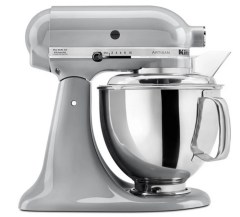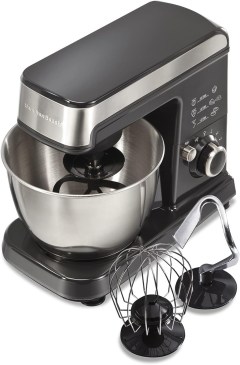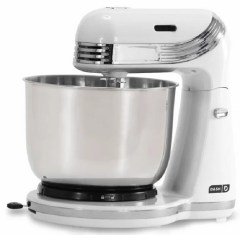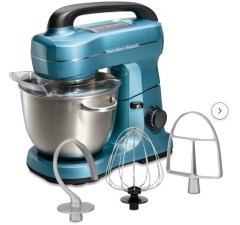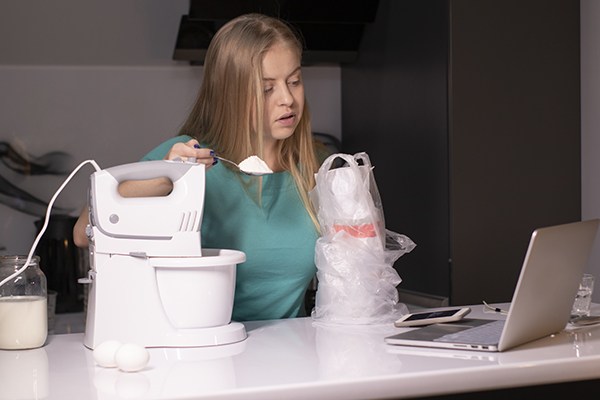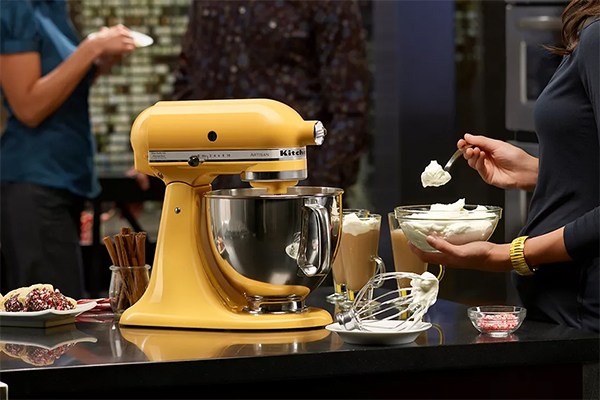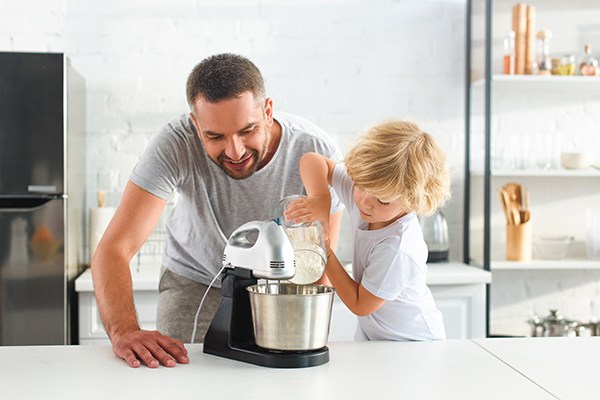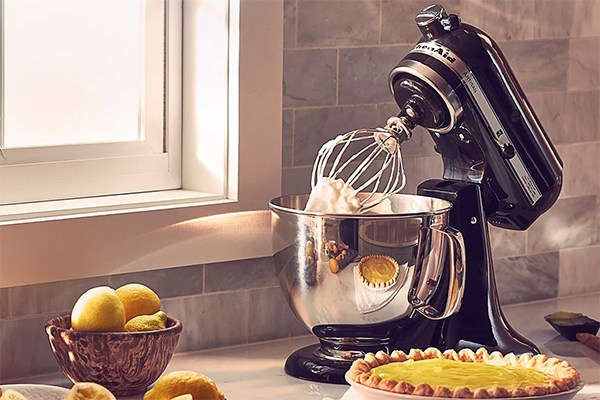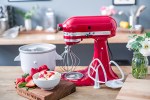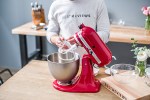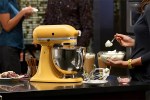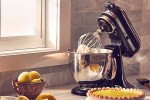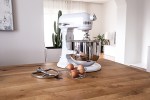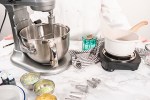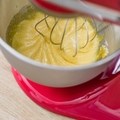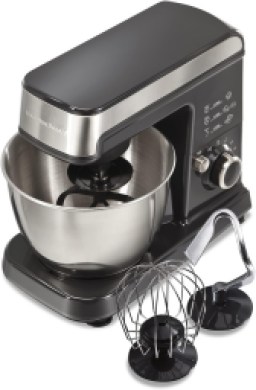Buying guide for Best stand mixers
Quite often, kitchen gadgets end up gathering dust at the back of a cupboard, but a stand mixer is an avid cook's best friend. Even if you've already decided a stand mixer has a definite place in your kitchen arsenal, you might find yourself overwhelmed trying to pick just one model from the hundreds on the market.
When you're ready to make your purchase, consider one of our recommendations. But first, read on for our full stand mixer guide.
What can you do with a stand mixer?
Before you commit to buying a stand mixer, you'll probably want to decide how much you'll actually use it. Many people aren't aware at first of all the different things you can do with a stand mixer. They often end up using it much more than they expected.
Here are just a handful of the tasks a stand mixer can tackle.
-
Let's start with the obvious — stand mixers can mix ingredients, for instance, to make cake or pancake batters.
-
Using the whisk attachment, stand mixers can whip things like egg whites and heavy cream.
-
Stand mixers make perfectly creamy mashed potatoes.
-
Most stand mixers come with a dough hook for kneading, which saves time when making bread or pizza from scratch.
-
Stand mixers are great for making pie crusts, shortbread, and other doughs that can become tough from too much heat and handling.
-
If you're making a large batch of guacamole, a stand mixer will save you time and effort.
-
Some stand mixers can use additional attachments that perform all kinds of tasks, including rolling out fresh pasta, grinding meat, milling grains, and even making ice cream.
For many bakers, a stand mixer is the most important tool in the kitchen, so we put a high value on finding premium models that will last for years.
In hands-on testing, we have learned that it’s usually most effective to get the right size stand mixer without going overboard, as the largest models aren’t always best for making small batches.
Because consistency is key when it comes to baking technique, we look for stand mixers with reliable, easy-to-use controls.
When assessing the value of a purchase, we note which attachments come with a stand mixer and which must be bought separately.
Dependable internals — motor, gears, hinge, body — are all big considerations when we select stand mixers for testing and recommendation.
We consider the wattage of a stand mixer before deciding whether to add it to our shortlist, bearing in mind that high wattage alone does not guarantee quality.
We research and test stand mixers that are suitable for both seasoned experts and early beginners — with adult supervision, of course.
In addition to the mixer itself, we look at any mixing bowls that come with it, noting bowl capacity and whether it would fit the needs of most consumers.
We appreciate stand mixers with high torque because it allows you to power through the thickest bread dough as easily as you can whip cream.
We consider the attractive appearance of colorful stand mixers as well as the ultra-rugged construction of stainless steel commercial models.
Considerations for selecting a stand mixer
Beaters, whisks, and other attachments
Without beaters, whisks, and other attachments, a stand mixer is no more than a glorified mixing bowl, so it's important to pay attention to which ones come with your mixer and which, if any, can be purchased separately.
These attachments generally come standard:
-
A flat beater, or ‘paddle,’ for general mixing
-
A flexi-beater for mixing wetter items, or any mixture where you need to scrape down the sides of the bowl
-
A whisk for whipping
-
A dough hook for kneading
Some high-end stand mixers have a wide range of additional attachments, allowing it to do the jobs of a number of other kitchen gadgets and appliances.
Here are some of the attachments you may be able to buy separately:
If your meringue or other product grows too much in volume during whipping, you can “collar” the bowl by taping a three- or four-inch wide strip of parchment around the entire lip on the exterior of the bowl. This effectively raises the height of the bowl and its capacity to contain the growing volume.
BestReviews Cooking and Baking Expert
Wattage
In simple terms, the higher the wattage of a stand mixer, the more powerful it is. However, this doesn't necessarily equate to better performance.
For instance, a high-end machine with a 300-watt motor will likely outperform a basic mixer with a 600-watt motor.
That said, wattage can be an indicator of whether or not a stand mixer will meet your needs (heavy-duty tasks will require higher wattage) when considered alongside other factors.
Capacity
Think about the capacity of the mixing bowl and whether it will suit the volume at which you cook.
For instance, if you only cook for one or two, a 4 or 4.5-quart bowl should suffice, but if you routinely cook for a large family, a model with a 6-quart capacity will be more your speed.
Expert Tip
If you’re picky about sanitation and cleanliness like I am, make sure to lay your stand mixer on its side and clean the gap around the rotating mixer head with a toothpick. Dough and icing can whip and flick up into this space and harden, then crumble back down into the bowl with the next thing you make. Yuck!
BestReviews Cooking and Baking Expert
Speed settings
A stand mixer must have a variety of speed settings, as some ingredients need to be mixed at a slower speed than others, and some mixtures require the cook to start on a low speed and gradually build up.
High-end models may have 10 or 12 speeds, but most users find 5 or 6 speeds to be perfectly adequate.
Splash guard
Splash guards come as standard with most stand mixers. They sit over the top of the bowl to stop ingredients flying out when the bowl is especially full, or the mixer is on a high-speed setting.
Your splash guard should be removable for easy cleaning, so you have the option not to use it if you don't want or need it.
Expert Tip
If you’re using citrus zest as part of whatever you’re making, it can collect on and cling to a whisk wire or paddle edge. During mixing, occasionally stop and lift your attachment out of the batter then use your clean fingertips to pinch-and-wipe all that good zest off, and place it back in the batter to distribute its flavor and color.
BestReviews Cooking and Baking Expert
Stand mixer tips
Follow these tips to make the most out of your stand mixer:
-
If you start mixing on high right away, dry ingredients, such as flour or powdered sugar, tend to get flung out of the bowl. Always start on the lowest speed setting until the ingredients are combined, then you can ramp up the speed.
-
Store all the basic attachments in the bowl when your stand mixer isn't in use. It will save space, and you'll never have to wonder where that whisk went.
-
For the fluffiest whipped cream and buttercream, chill the bowl and beater before you get started.
-
The beater shouldn't touch the bottom of your stand mixer's bowl, nor should it be too far from the bottom, otherwise ingredients won't get properly whipped or mixed.
-
If you feel the motor getting very hot, turn off your stand mixer and leave it to cool for a few minutes before restarting.
-
Most people find they're more likely to use their stand mixer regularly if they keep it on the counter. Check the product specifications to see if the model you're considering will fit on your worktop.
For your safety
To avoid the motor burning out, always follow the manufacturer's guidelines regarding how long you can run your stand mixer in one session.
STAFF
BestReviews
Stand mixer prices
High-end stand mixers are a bit of an investment, but you'll find some budget choices, too, which are fine for occasional use.
Basic stand mixers
These cost around $30 to $70. They tend to have smaller bowls and lower wattage. They aren't usually compatible with any non-standard attachments, like ice cream makers or juicers.
Mid-range stand mixers
These cost roughly $80 to $200. These include good, durable models for regular — but not heavy-duty — use. At the top end of the price range, some are compatible with non-standard attachments, but most aren't.
High-end stand mixers
Expect to pay anywhere between $200 and $500 for these. They are top-notch machines that will stand up to daily, heavy-duty use. Most are compatible with non-standard attachments, but you will need to purchase them separately.
Expert Tip
Higher-end and better-known models rarely (if ever) go on sale, so waiting to purchase only delays your baking. If you see your favorite nice model at a bargain store where you can use a standard coupon, do the math. Frequently, you end up paying the same as you would at a regular retailer of kitchen products.
BestReviews Cooking and Baking Expert
FAQ
Q. Are stand mixer bowls and attachments dishwasher safe?
A. This varies between different makes and models. If it's important to you, check the manufacturer's specifications to see if the stand mixer you're considering has dishwasher safe bowls and attachments.
Q. What do I do if the beater or whisk is sitting too high in the bowl and the ingredients aren't getting properly mixed?
A. This is a common problem, but the good news is, there's a simple solution. The beater height is adjustable, meaning you can lower the beater so it gets to all the ingredients in the bottom on the bowl. Check the instruction manual to learn how to adjust the beater height, as this varies between different stand mixers.
Q. Can I buy replacement bowls and attachments for my stand mixer?
A. You can buy replacement bowls and attachments for the majority of stand mixers. This is handy if one of yours gets lost or breaks. Plus, some people who do a lot of high-volume baking like to have an extra bowl and beaters so they don't have to do the dishes between batches.


